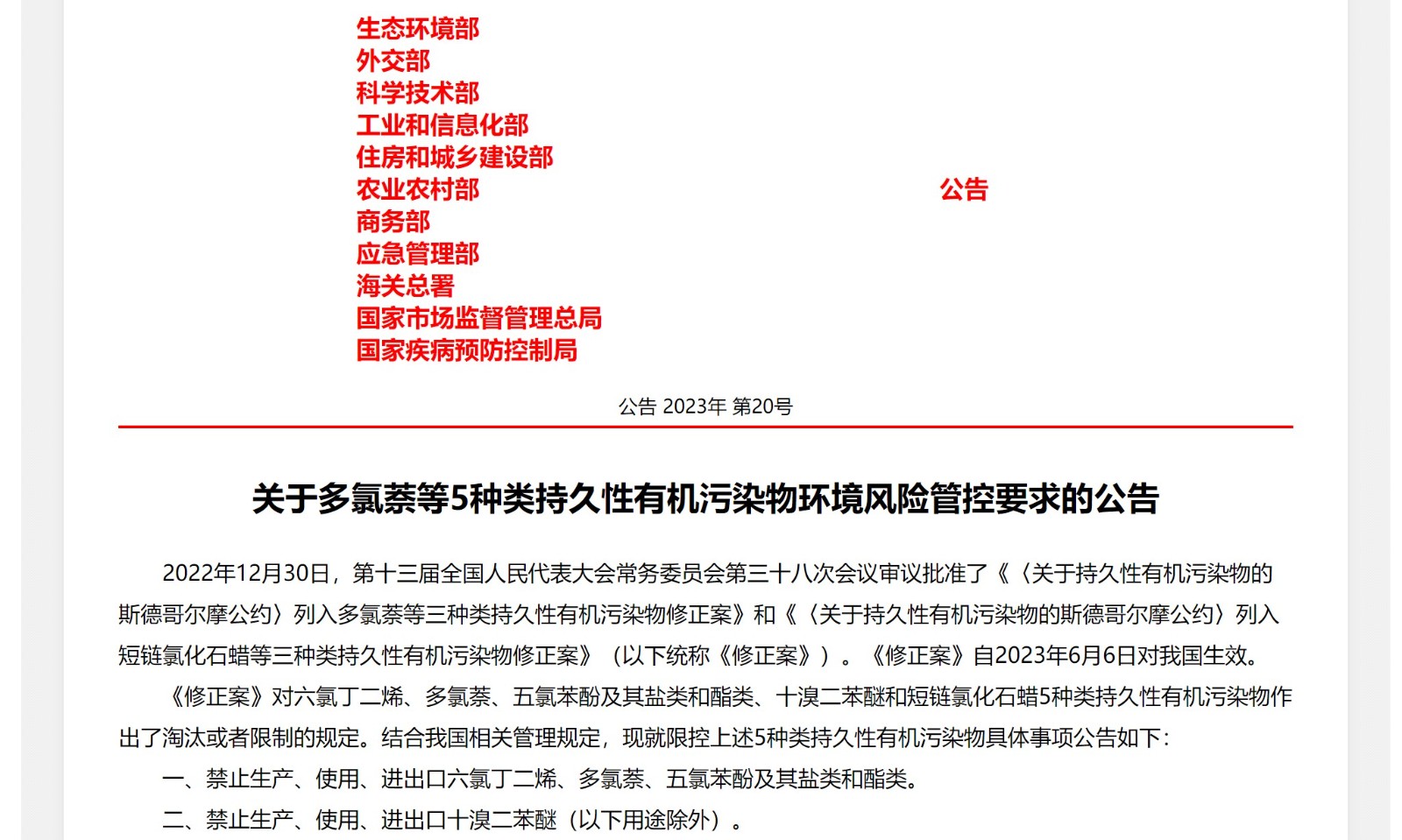On June 6, 2023, China's Ministry of Ecology and Environment (MEE), together with ten other ministries, published the Announcement on Environmental Risk Control Requirements for Five Persistent Organic Pollutants (POPs) Including Polychlorinated Naphthalene. It prescribes specific requirements for the elimination or restriction of five POPs namely:
- hexachlorobutadiene;
- polychlorinated naphthalene;
- pentachlorophenol and its salts and esters;
- decabromodiphenyl oxide; and
- short-chain chlorinated paraffins (SCCPs).
This Announcement shall enter into force immediately following the announcement that it would be doing so on December 30, 2022. Certain exemptions apply, please see below.

On December 30, 2022, the Amendments to the Stockholm Convention on Persistent Organic Pollutants to List Three Persistent Organic Pollutants Including Polychlorinated Naphthalenes and the Amendments to the Stockholm Convention on Persistent Organic Pollutants to List Three Persistent Organic Pollutants Including Short-Chain Chlorinated Paraffins (hereinafter referred to as the Amendment) was officially approved on the 38th Session of the 13th Standing Committee of the National People’s Congress. The Amendment entered into force in China on June 6, 2023.
The Amendment specifies eliminations or restrictions on five POPs:
- hexachlorobutadiene;
- polychlorinated naphthalenes;
- pentachlorophenol and its salts and esters;
- decabromodiphenyl oxide; and
- short-chain chlorinated paraffins (SCCPs).
Based on the current situation in China, specific management measures for these five POPs are enumerated in the following:
I. Production, use, import, and export of hexachlorobutadiene, polychlorinated naphthalenes, pentachlorophenol and its salts and esters are prohibited.
II. Production, use, import, and export of decabromodiphenyl oxide are prohibited (except for the following uses):
- Use in textile products (excluding clothing and toys) that have the characteristic of flame retardancy;
- Use as additives for plastic enclosure and as components of household heating appliances, iron, fans, and immersion heaters, which contain or directly contact electrical parts, or need to comply with flame-retardant standards, with a density lower than 10% of the weight of the component.
- Used as polyurethane foam plastics for building insulation.
These above uses are exempted until December 31, 2023.
III. Production, use, import, and export of short-chain chlorinated paraffins are prohibited except for the following uses:
- additives for the manufacture of conveyor belts in the natural and synthetic rubber industry;
- components for the production of conveyor belts in the mining and forestry industry;
- leather fat in the leather industry;
- lubricant additives; especially for engines in automobiles, generators, and wind energy facilities, as well as for diesel refinery and oil and gas exploration and drilling;
- in outdoor decorative lighting;
- in waterproof and fire-retardant paints;
- adhesives;
- in metal processing; and
- as a secondary plasticizer of flexible polyvinyl chloride (but not used in toys and children’s products).
These above uses are exempted until December 31, 2023.
IV. Enterprises, institutions, manufacturers and operators discharging hexachlorobutadiene and polychlorinated naphthalenes should take effective measures to reduce emissions or eliminate emission sources. Alternative technologies are highly encouraged to prevent the generation and emission of hexachlorobutadiene and polychlorinated naphthalenes.
V. Unless otherwise specified, chemicals used for laboratory research or used as reference materials, as well as chemicals that appear as unintentional trace contaminants (UTC) in products and articles, are not subject to the aforementioned requirements regarding the prohibition or restriction of production, use, import, and export.
VI. Departments at all levels shall strengthen the supervision and management of the production, use, import, and export of these five POPs in accordance with relevant national laws and regulations. This applies to those under the ministries of:
- ecology and environment;
- industry and information technology;
- housing and urban-rural development;
- agriculture and rural affairs, ministry of commerce;
- emergency management;
- market supervision and administration;
- disease prevention and control; and
- customs.
Any violation will be thoroughly investigated and dealt with in accordance with the law.
This Announcement entered into force on June 6, 2023.
Details of these substances are listed in the following table:
Serial No. | English Name | Chinese Name | CAS No. | HS code |
1 | Hexachlorobutadiene | 六氯丁二烯 | 87-68-3 | 2903299020 |
2 | Pentachlorophenol and its salts and esters | 五氯苯酚及其鹽類和酯類 | 87-86-5 131-52-2 27735-64-4 3772-94-9 1825-21-4 | 2908110000 2908199023 2908199024 2915900014 2903309017 |
3 | Polychlorinated naphthalene, including dichloronaphthalene, trichloronaphthalene, tetrachloronaphthalene, Pentachloronaphthalene, Hexachloronaphthalene, Heptachloronaphthalene, Octachloronaphthalene | 多氯萘,包括二氯萘、三氯萘、四氯萘、五氯萘、六氯萘、七氯萘、八氯萘 | - | 2903999050 and so on |
4 | Decabromodiphenyl oxide | 十溴二苯醚 | 1163-19-5 | 2909309018 |
5 | Short-chain chlorinated paraffins (SCCPs)* | 短鏈氯化石蠟 | For example: 85535-84-8 68920-70-7 71011-12-6 85536-22-7 85681-73-8 108171-26-2 | 3824890000 |
*Short-chain chlorinated paraffins (SCCPs): straight-chain chlorinated hydrocarbons with chain lengths ranging from C10 to C13 and a content of chlorine greater than 48% by weight, the content of SCCPs in mixtures equals to or greater than 1% by weight.
If you need any assistance or have any questions, please get in touch with us via service@jianzaoshiwang.cn.

